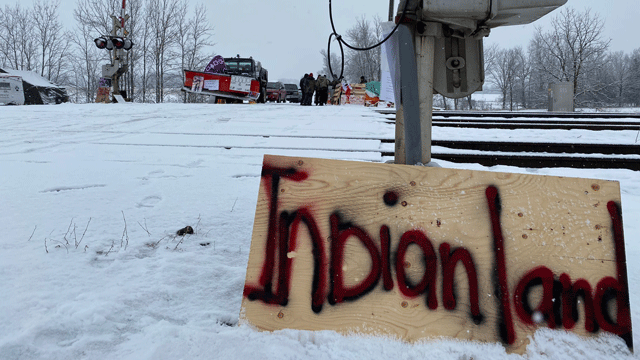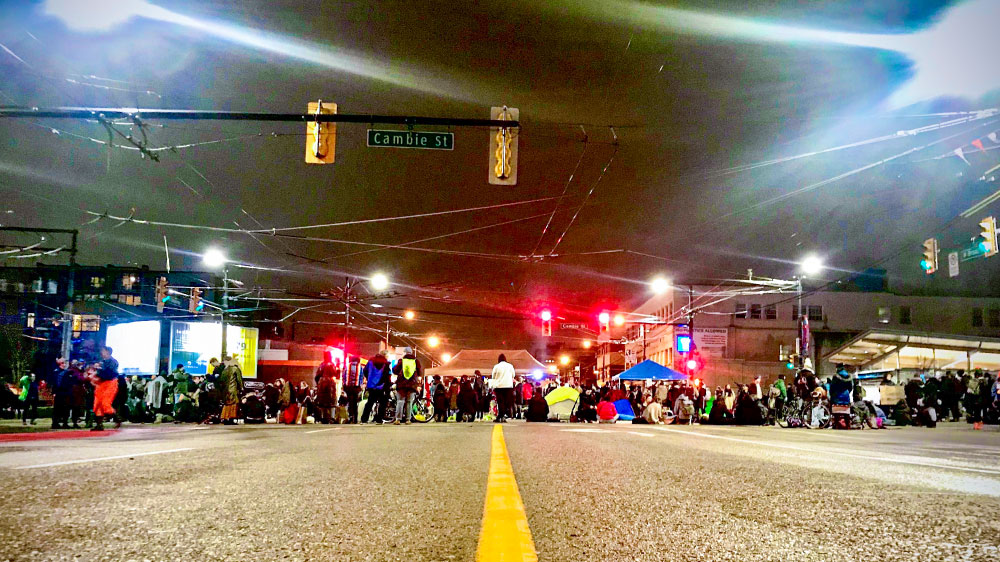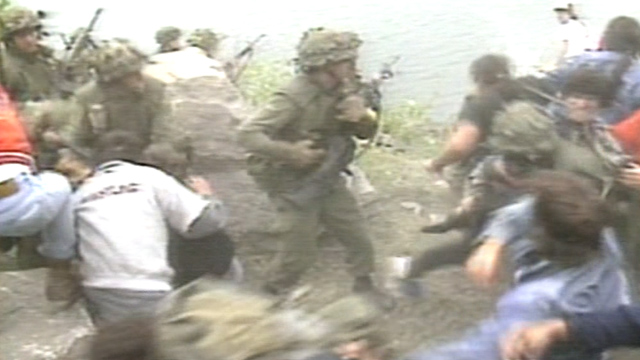
(People gather near train tracks close to Tyendinaga Mohawk Territory. Photo: Jamie Pashagumskum/APTN)

It seems everywhere you turn today there is a demonstration in the streets or at railways and even in government office buildings.
If that sounds familiar that’s because it is.
Just seven years ago Idle No More did much of the same in response to the former Stephen Harper government that was ramming an omnibus bill through the House of Commons that in part stripped the protection of many lakes and rivers.
Today, the disrespect shown to traditional Wet’suewet’en law by the approval of a natural gas pipeline through its territory and the RCMP used as enforcers to remove people standing in its way has triggered a similar reaction to Idle No More.
In fact, in some ways it’s much stronger today. Some members of the Mohawks of the Bay of Quinte in Tyendinaga have been able to shut down the Canadian National Railway’s mainline, and Via Rail, for over a week without actually blocking the tracks. They are simply set up next to the tracks.
They haven’t even appeared to have messed with the tracks, unlike during Idle No More where at least three times the tracks were shutdown after Mohawks triggered the arms to come down at the crossing.
And even then, their actions lasted only a few hours at a time.
There also appears to be much more non-Indigenous support in the early going for the Wet’suewet’en, unless you listen to some of the reporters blocked from getting into the British Columbia legislature or politicians who can’t get into their offices due to sit-ins.
For some they see similarities of something more severe.
“I think that people are already pointing to it as kind of an Oka crisis,” said Candis Callison, who is Tahltan and an associate professor at the University of British Columbia’s graduate school of journalism.

The Oka crisis happened in the summer of 1990 during the Battle of the Pines triggered by the Village of Oka’s desire to expand a golf course over Mohawk burial grounds and Canada called in the military.
The Canadian military’s last serious involvement in a conflict triggered by an assertion of Indigenous rights came in 1995 during the Gustafson Lake standoff, also in British Columbia, where warriors dug in to protect Sundance grounds. The military provided the RCMP with armoured personnel carriers and drivers during the conflict which saw police and warriors exchange tens of thousands of rounds in firefights.
Callison’s complete interview with Nation to Nation host Todd Lamirande can be watched below.
While events unfolded this week, delegates attended a modern day treaty conference in Ottawa.
Nation to Nation spoke to Celeste Haldane, the treaty commissioner in B.C.
Haldane gave a speech about the province’s adoption of the United Nations Declaration on the Rights of Indigenous Peoples.
But she called it a missed opportunity because modern treaty holders weren’t consulted.
“If we want to think about modern treaties as the way to operationalize and implement the UN declaration, I think the insights and perspectives that those modern treaty and self-governing nations hold would have been important to include in that discussion as they were building out the legislation,” said Haldane.
After Haldane’s speech, Teslin Tlingit’s executive councillor expressed frustration with the federal government.
“How do we keep government accountable for when they go against what they’ve agreed to? When they go against this reconciliation they’re always talking about?” Duane Aucoin asked Haldane.
She answered by focused on Trudeau government’s promise to develop a national treaty commission.
“You need that independence or independent body to be a part of that process ensuring that it’s a level playing field when it comes to implementing treaties and making recommendations,” said Haldane.
But the elephant in the room was the ongoing conflict in Wet’suewet’en territory.
Haldane believes a modern treaty agreement could have avoided it.
“I think it would have provided a different conduit to have that discussion around free, prior and informed consent because given that treaties and modern treaties are constitutionally entrenched and the Crown must actually secure consent,” she said. “That’s what’s envisioned in a modern treaty and that’s again the standard set out in the UN declaration. I’m not suggesting that it would have been an automatic yes, because as you can see circumstances are different in each community.”
Tlicho Grand Chief George MacKenzie also joined Nation to Nation.
His nation in the Northwest Territories has signed a modern treaty.
And McKenzie said it’s working.
“We can have a say in the co-management of the resources in the Northwest Territories, especially in Tlicho territory,” he said.











Demonstrators should be warned,arrested if warnings ignored,released with warning,arrested and charged if engaged in subsequent blockade.If Police won’t arrest,call in Army.
Trudeau agreed to all 90 plus recommendations of TRC.Reconciliation is a process,not an event,and it takes time.While Indigenous may not care about how working Canadians are inconvenienced about stopping trains in a Canadian winter,where essential goods including heating fuels are prevented from getting to homeowners,”Colonial Settler” voters like myself may well choose to elect a less enthusiastic and sympathetic Government to engage in negotiations in Reconciliation. I have voted for Trudeau in the last two elections,but because of his handling of this Indigenous created crisis,I will vote for a Conservative agenda next election..Just sayin’.